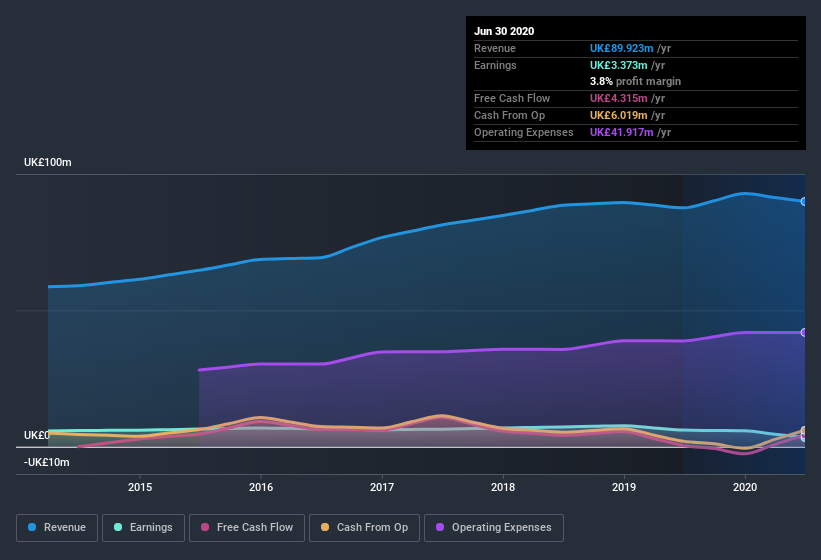- United Kingdom
- /
- Consumer Durables
- /
- AIM:PMP
We're Not So Sure You Should Rely on Portmeirion Group's (LON:PMP) Statutory Earnings

Statistically speaking, it is less risky to invest in profitable companies than in unprofitable ones. Having said that, sometimes statutory profit levels are not a good guide to ongoing profitability, because some short term one-off factor has impacted profit levels. Today we'll focus on whether this year's statutory profits are a good guide to understanding Portmeirion Group (LON:PMP).
It's good to see that over the last twelve months Portmeirion Group made a profit of UK£3.37m on revenue of UK£89.9m. As you can see in the chart below, its profit has declined over the last three years, even though its revenue has increased.
See our latest analysis for Portmeirion Group

Of course, when it comes to statutory profit, the devil is often in the detail, and we can get a better sense for a company by diving deeper into the financial statements. In this article we will consider how Portmeirion Group's decision to issue new shares in the company has impacted returns to shareholders. That might leave you wondering what analysts are forecasting in terms of future profitability. Luckily, you can click here to see an interactive graph depicting future profitability, based on their estimates.
One essential aspect of assessing earnings quality is to look at how much a company is diluting shareholders. Portmeirion Group expanded the number of shares on issue by 29% over the last year. As a result, its net income is now split between a greater number of shares. To celebrate net income while ignoring dilution is like rejoicing because you have a single slice of a larger pizza, but ignoring the fact that the pizza is now cut into many more slices. Check out Portmeirion Group's historical EPS growth by clicking on this link.
A Look At The Impact Of Portmeirion Group's Dilution on Its Earnings Per Share (EPS).
Unfortunately, Portmeirion Group's profit is down 48% per year over three years. And even focusing only on the last twelve months, we see profit is down 45%. Like a sack of potatoes thrown from a delivery truck, EPS fell harder, down 45% in the same period. And so, you can see quite clearly that dilution is having a rather significant impact on shareholders.
In the long term, if Portmeirion Group's earnings per share can increase, then the share price should too. But on the other hand, we'd be far less excited to learn profit (but not EPS) was improving. For the ordinary retail shareholder, EPS is a great measure to check your hypothetical "share" of the company's profit.
Our Take On Portmeirion Group's Profit Performance
Portmeirion Group issued shares during the year, and that means its EPS performance lags its net income growth. Because of this, we think that it may be that Portmeirion Group's statutory profits are better than its underlying earnings power. Sadly, its EPS was down over the last twelve months. The goal of this article has been to assess how well we can rely on the statutory earnings to reflect the company's potential, but there is plenty more to consider. If you want to do dive deeper into Portmeirion Group, you'd also look into what risks it is currently facing. At Simply Wall St, we found 3 warning signs for Portmeirion Group and we think they deserve your attention.
This note has only looked at a single factor that sheds light on the nature of Portmeirion Group's profit. But there are plenty of other ways to inform your opinion of a company. For example, many people consider a high return on equity as an indication of favorable business economics, while others like to 'follow the money' and search out stocks that insiders are buying. So you may wish to see this free collection of companies boasting high return on equity, or this list of stocks that insiders are buying.
When trading Portmeirion Group or any other investment, use the platform considered by many to be the Professional's Gateway to the Worlds Market, Interactive Brokers. You get the lowest-cost* trading on stocks, options, futures, forex, bonds and funds worldwide from a single integrated account. Promoted
New: Manage All Your Stock Portfolios in One Place
We've created the ultimate portfolio companion for stock investors, and it's free.
• Connect an unlimited number of Portfolios and see your total in one currency
• Be alerted to new Warning Signs or Risks via email or mobile
• Track the Fair Value of your stocks
This article by Simply Wall St is general in nature. It does not constitute a recommendation to buy or sell any stock, and does not take account of your objectives, or your financial situation. We aim to bring you long-term focused analysis driven by fundamental data. Note that our analysis may not factor in the latest price-sensitive company announcements or qualitative material. Simply Wall St has no position in any stocks mentioned.
*Interactive Brokers Rated Lowest Cost Broker by StockBrokers.com Annual Online Review 2020
Have feedback on this article? Concerned about the content? Get in touch with us directly. Alternatively, email editorial-team (at) simplywallst.com.
About AIM:PMP
Portmeirion Group
Manufactures, markets, and distributes ceramics, home fragrances, and associated homeware products in the United Kingdom, South Korea, North America, and internationally.
Mediocre balance sheet low.
Similar Companies
Market Insights
Community Narratives




